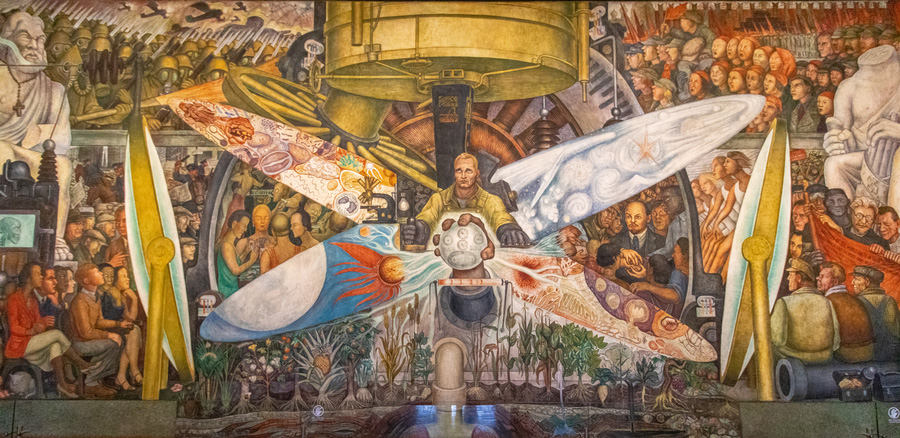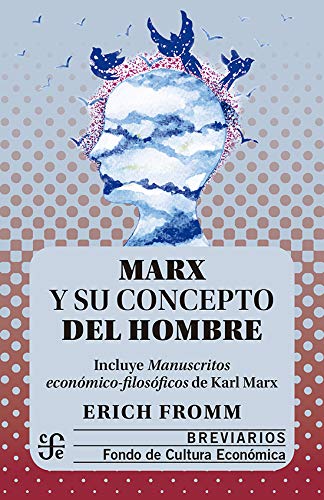
Marx and his concept of man
HUMAN ALIENATION
Essay on the book: Marx and his concept of man.
Essay on the book: Marx and his concept of man.
- The experimental and irreverent art of David Alfaro Siqueiros was the promoter of an authentically Mexican artistic identity, which emerged from the Revolution, the encounter with the European avant-garde and his interest in rescuing the roots of Mesoamerican culture.
Introduction
We are deeply concerned about the dehumanizing effects that the modern capitalist system can produce. Throughout history, many thinkers have reflected on how to recover our humanity in this context. One of them was Karl Marx, who in his Economic-Philosophical Manuscripts of 1844 argued that under capitalism man had become a mere commodity subject to market forces.
Marx passionately recounted how, in the factories of the time, workers were reduced to mere cogs in the machines, losing all contact with their human essence. “The worker’s activity is no longer his own, but alien, forced activity,” he wrote starkly. Nevertheless, his words resonated with a profound vocation for change, convinced that another system must be possible. He thus invited us to reflect on our condition.
While textiles and metallurgy have seen remarkable technological advances since then, many analysts argue that the alienation Marx diagnosed has become more acute in the digital age. Data such as the fact that on average a person spends most of their waking day interacting with screens reinforces this idea. Has technology turned us into mere consumers consumed by consumption? Have we lost our human essence in the tumult of the marketplace?
It is in this context that it is timely to review Marx’s ideas. In these Manuscripts he discovered the fundamental causes of alienation and proposed a way out: the overcoming of private property through communism. By examining his analysis we could discern whether his perspective is still useful to understand our times or whether, on the contrary, it is obsolete. Throughout this essay we will explore this question carefully.
THE ANALYSIS OF ALIENATED LABOR
In his analysis of alienated labor, Marx states that under capitalism the worker loses control over his labor activity and his product. I remember the first time I visited a textile factory and witnessed this reality. The workers looked like cogs in a big machine, performing the same movements over and over again at a rhythm set by the machines. I was struck by how disconnected they looked from their work.
Marx graphically described this experience when he pointed out that “the activity of the worker is no longer his own, but the activity of others, forced”. His words conveyed indignation, for he clearly understood that behind this process lay the exploitation of man by man. However, there was also hope in his message when he urged to overcome this state of affairs.
In one of his writings, Marx states that under capitalism “the worker is externalized and alienated in his work… His active life is activity for another and of another”. This closely mirrors what we witnessed in the factory, where the energy of the workers seemed to be drained for the benefit of a few. Their bodies were there but their minds seemed absent, as if something very valuable (their thinking) had been taken away from them.
“A man’s productivity is measured by what he produces, not by what he realizes and enjoys,” Erich Fromm tells us. I think this idea sums up masterfully what Marx objected to about the social relations of production in his time. Being deprived of the fruit of his effort, the worker felt like a kind of robot at the service of an alienating machine.
THE LINK BETWEEN ALIENATED LABOR AND PRIVATE PROPERTY
According to Marx, private property is the material reflection of the alienation of labor, for through it the worker is deprived of the fruit of his labor. Thus, the division between worker and capitalist is simply the economic expression of this alienation.
In delving deeper into this idea, Marx discovers that the worker inadvertently forged the chains that oppress him today. For by surrendering his activity as a commodity to capital, the latter ended up subjecting him to its will. In this way, the worker “not only produces his relation to the object, but also the relation of the non-worker to production and to the product”.
This reasoning makes it possible to understand that the alienation of labor and private property are in reality two sides of the same coin. For by externalizing his labor, the worker “produces the relation of non-ownership to property,” giving up de facto control over his activity. Consequently, we can safely say that “private property is the product, the necessary consequence, of alienated labor”.
However, this reciprocal relationship between alienated labor and private property was not evident to Marx from the outset. It was necessary for experience to show him the core of this perverse link, which hides under the veil of economics a deep wound in the human condition. Only in this way could he fully understand that only by overcoming both phenomena would we be able to restore man’s dignity.
COMMUNISM AS OVERCOMING ALIENATION
For Marx, communism represents the definitive overcoming of human alienation. For him, this mode of production would allow man to regain control over his activity and its fruits.
Finally, communism would mean the longed-for reappropriation of the individual of himself. He would no longer be deprived of the product of his effort nor of his own essence, which would be reflected again in his creation. This would be possible because the products of labor would no longer be presented as “alien and hostile forces,” but as an expression of humanity itself embodied in the community.
Marx saw in communism the culmination of historical evolution, equivalent to the return of the human being to himself. “The definitive resolution of the conflict between man and nature”, he said, citing the end of the “conflict between existence and essence”. In this way, the faculties of the individual would cease to be repressed, to unfold freely.
This evolving vision of emancipatory communism helped Marx to endure the rigors of a precarious life, devoted body and soul to the workers’ cause. In doing so, he became a spokesman for the hopes of millions in an adverse world. At the same time, such an interpretation underpinned his iron will for social transformation.
However, the Soviet experience showed that collective ownership does not by itself guarantee human freedom. It is necessary to create institutions where the self-determination of citizens is expressed. Only in this way will self-management cease to be a chimera and become a reality.
THE LIMITATIONS OF THE NOTION OF ALIENATION
Although the concept of alienation elaborated by Marx made it possible to bring to the table the contradictions of the capitalist system, over time some analysts have raised certain limitations in his approach that are worth evaluating.
One of the questions raised refers to the fact that Marx’s notion of alienation has a very economic and productivist focus, centered only on the labor sphere. This overlooks other equally alienating dimensions of human experience such as family relations or political repression. On the other hand, it has also been pointed out that the concept suffers from rigidity in drawing a sharp duality between alienation under capitalism and a hypothetical non-alienation under communism.
However, other thinkers recognize the depth of Marxist intuition in uncovering the hidden power relations in a class-divided society. Moreover, they stress that in focusing on alienation in labor, Marx was simply starting from its immediate reality in nineteenth-century capitalism, rather than pretending to exhaust all the flanks of alienated life.
Evaluating these approaches carefully, we could conclude that although Marx’s notion suffers from some reductionist excesses typical of his time, he succeeded in capturing in a privileged way the essence of the capital-labor contradiction that is hidden in any class society. While the points about its limitations are in part relative, they do not invalidate the depth of his acute intuition.
As we have seen, Marx’s concept of alienation, despite its limitations, constitutes a theoretically broad and valuable range for understanding the roots of the reification of the human being in modernity. By illuminating the contradictions of the capitalist system, he laid the foundations for overcoming them through an emancipatory social organization.
The analysis of his successes and failures invites us to continue to deepen our understanding of his thought. Beyond dogmatism, it should serve to advance in the full liberation of human potential, an objective that is still pending.

CONCLUSION
Throughout this essay we have gone through Marx’s pioneering analysis of labor alienation under capitalism, key to understanding the entrails of this system and the mutations through which human experience has passed.
Marx identified how the appropriation of the fruits of labor by others condemns the worker to dehumanization. In his time, he revealed the fetishistic character of commodities and the contradictions of this mode of production. Below, we evaluate the limitations and successes of his approach in the face of the criticisms received.
Alienation continues in new forms in the age of hyper-consumption and automation. Environmental challenges also reveal how Western anthropocentrism has led to the depredation of nature. However, reading Marx renews hope that by discovering our chains, we take a step towards breaking them.
If we are to overcome the sense of estrangement that afflicts broad sectors, we must rethink our mode of social, economic, political and cultural organization. Only by regaining control over our lives and the collective fruit of our activity will we achieve full human fulfillment.





0 comments